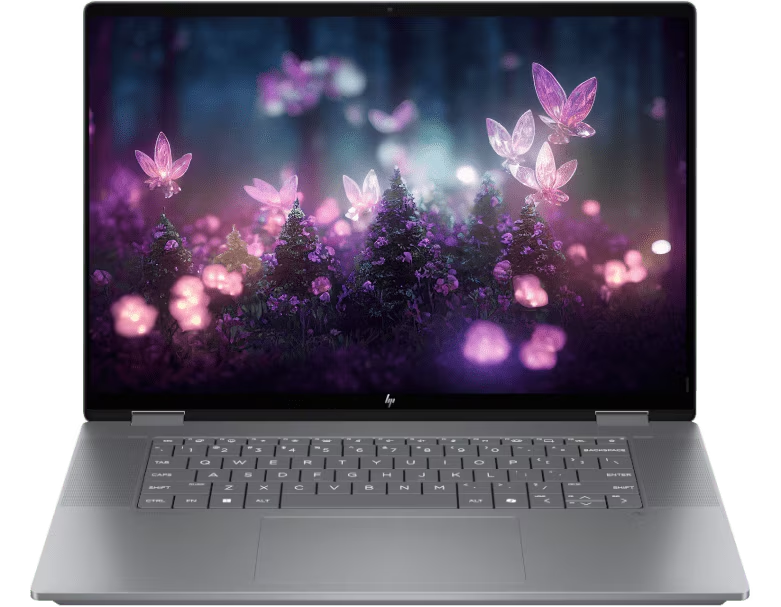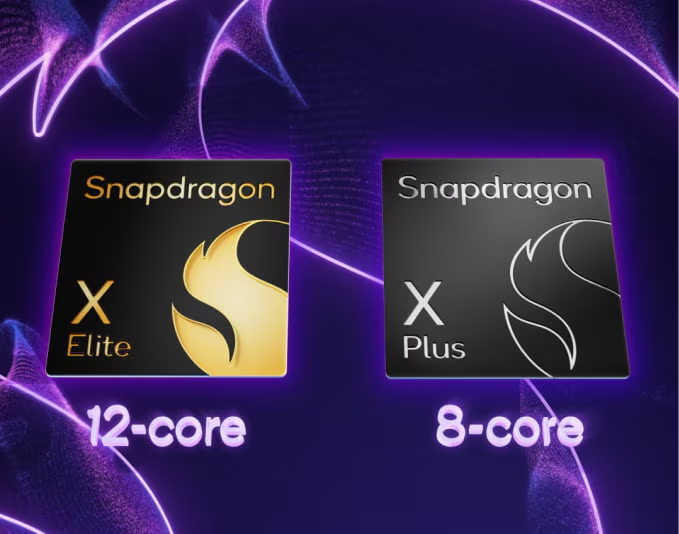The HP Omnibook X is aimed at anyone who wants a compact, quiet ultrabook with all-day battery life, powered by Qualcomm’s latest Snapdragon platform.
We used it as our daily driver for weeks, and while its design and typing experience left a great impression, a few key shortcomings became clear over time. This isn’t a machine built for heavy creative workloads. It’s more at home handling office tasks and day-to-day use with a touch of premium flair.
Design and build — Elegant, solid, and nearly top-tier

First impressions are excellent: a slim chassis, rounded edges, and a minimalist HP logo on the lid. The keyboard and touchpad are among the best we’ve used on recent ultrabooks —solid, responsive, and a pleasure to use.
But a couple of small details keep it from perfection: there’s no practical lip or notch to lift the lid easily, and the weight balance makes one-handed opening tricky compared to rivals.
Pros
Slim, minimalist, premium-feeling design.
Solid, three-level backlit keyboard.
Smooth, accurate touchpad with a satisfying click.
Contras
Lid is awkward to open.
Poor weight balance for one-handed lift.
Display and audio — Fine, but falls short of the best
The 14-inch IPS touchscreen delivers a 2240 × 1400 resolution and accurate color (100% sRGB), but its 60 Hz refresh rate and modest brightness mean you’ll need to crank it to 70–80% indoors. Outdoor visibility is limited.

Audio is also a weak spot: the downward-firing stereo speakers lack the volume and clarity you’ll find on a MacBook Air, Lenovo Yoga, or Asus ZenBook.
Pros
Well-calibrated colors.
Touchscreen functionality.
Cons
Low brightness for outdoor use.
Only 60 Hz refresh rate.
Weak, less detailed sound.
Into serious multitasking? Check out our review of the ASUS Zenbook DUO and its impressive dual-screen setup.
Performance — Plenty of power, if the software keeps up
The Snapdragon X Elite 781 holds its own against Intel’s Core Ultra Series 2 and high-end AMD chips —as long as the apps you use are optimized for ARM.

In non-native apps like Adobe Premiere Pro, exporting a 14-minute 4K video took over 30 minutes, compared to under 10 minutes on an equivalent Intel laptop. This isn’t a gaming machine, though native game support is expected to improve later.
Pros
Fast, efficient processor.
32 GB RAM and 1 TB SSD.
Cons
Limited native app support.
Not designed for gaming or heavy graphics.
Looking for more Snapdragon options or a great value alternative? Check out the Acer Swift 14 AI with its OLED display.
Battery life — Among the very best
Despite a smaller 59 Wh battery, we averaged around 10.5 hours of real-world use, putting it in the top tier of ultrabooks we’ve tested. In 4K streaming, it managed roughly 15 hours. This efficiency is helped by the modest refresh rate and resolution.
Pros
Excellent all-day battery life.
Runs quiet and stays cool.
Cons
Shorter video playback endurance than some lower-resolution OLED rivals.
Final verdict — An ultrabook that shines in battery life, but not in everything
The HP Omnibook X combines premium design, a fantastic keyboard, and excellent battery life with the efficiency of Snapdragon X Elite. It’s a great fit for users who prioritize portability, silence, and endurance in a next-gen Windows ARM laptop.
That said, its dim screen, average audio, and reliance on optimized software hold it back from being the ultimate all-rounder — especially for multimedia or heavier creative work.
Tech specs
| Feature | Details |
| Display | 14″ IPS touchscreen, 2240 × 1400 px, 60 Hz, 100% sRGB |
| Processor | Qualcomm Snapdragon X Elite 781 |
| RAM | 32 GB |
| Storage | 1 TB SSD |
| Battery | 59 Wh |
| Estimated battery life | 10.5 h daily use / 15 h 4K video |
| Keyboard | Backlit (3 levels) |
| Audio | Downward-firing stereo speakers |
Alternatives
- Microsoft Surface Laptop 7: 120 Hz display, refined design, less RAM, slightly higher price.
- Acer Swift 14 AI: 1920 × 1200 OLED, integrated Intel GPU, better for light gaming, significantly cheaper.
- MacBook Air M4: Excellent battery life, premium design, stellar optimization — but locked to Apple’s ecosystem.
